Write Us
We are just a call away
[ LET’S TALK AI ]
X
Discover AI-
Powered Solutions
Get ready to explore cutting-edge AI technologies that can transform your workflow!

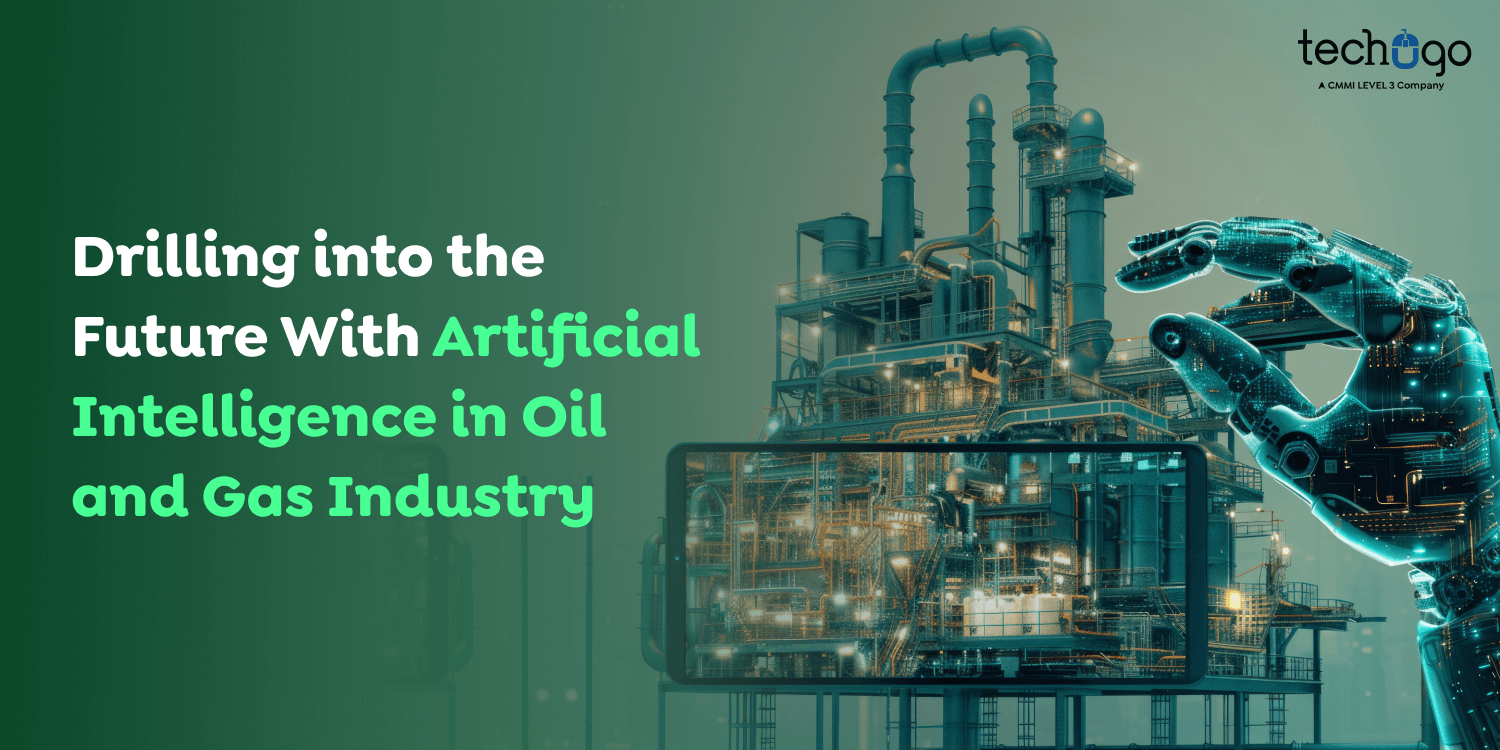
The oil and gas industry offers a considerable portion of the world’s energy. It powers the states’ economies and fuels transportation, electrical power, and manufacturing. This business involves highly complicated processes – from exploration to production and distribution. However, it continually wrestles with multiple persistent challenges: pricing fluctuations and impacts of inefficiencies, environmental risks, and increasing pressures by regulators. In addition, unknown reservoir locations, equipment failure, and health and safety hazards contribute highly to the potential risk management, efficiency and cost control , which are prime concerns for firms.
Artificial intelligence has promising solutions for some of the traditional challenges. AI can positively promote predictive maintenance, production, and automation in industry exploration activities. For instance, predicting failures in equipment using AI algorithms within predictive analytics will reduce the percentage cost of maintenance. Applying AI models to analyze seismic data in exploration activities enhances the discovery rate by 30-50% while reducing operational risks. Process automation and AI-driven analytics lead to up to 10 percent efficiency gains in producing oil and gas producers by reducing waste and emissions.
Environmental compliance is another area of support where AI development can help in the real-time monitoring of emissions while complying with the regulations. Companies will see AI changing the dynamics as the global AI market in oil and gas will go from $2.3 billion in 2020 to $5.2 billion by 2026. Hence, it ensures a competitive advantage towards sustainability and competitive advantages in such a volatile industry.
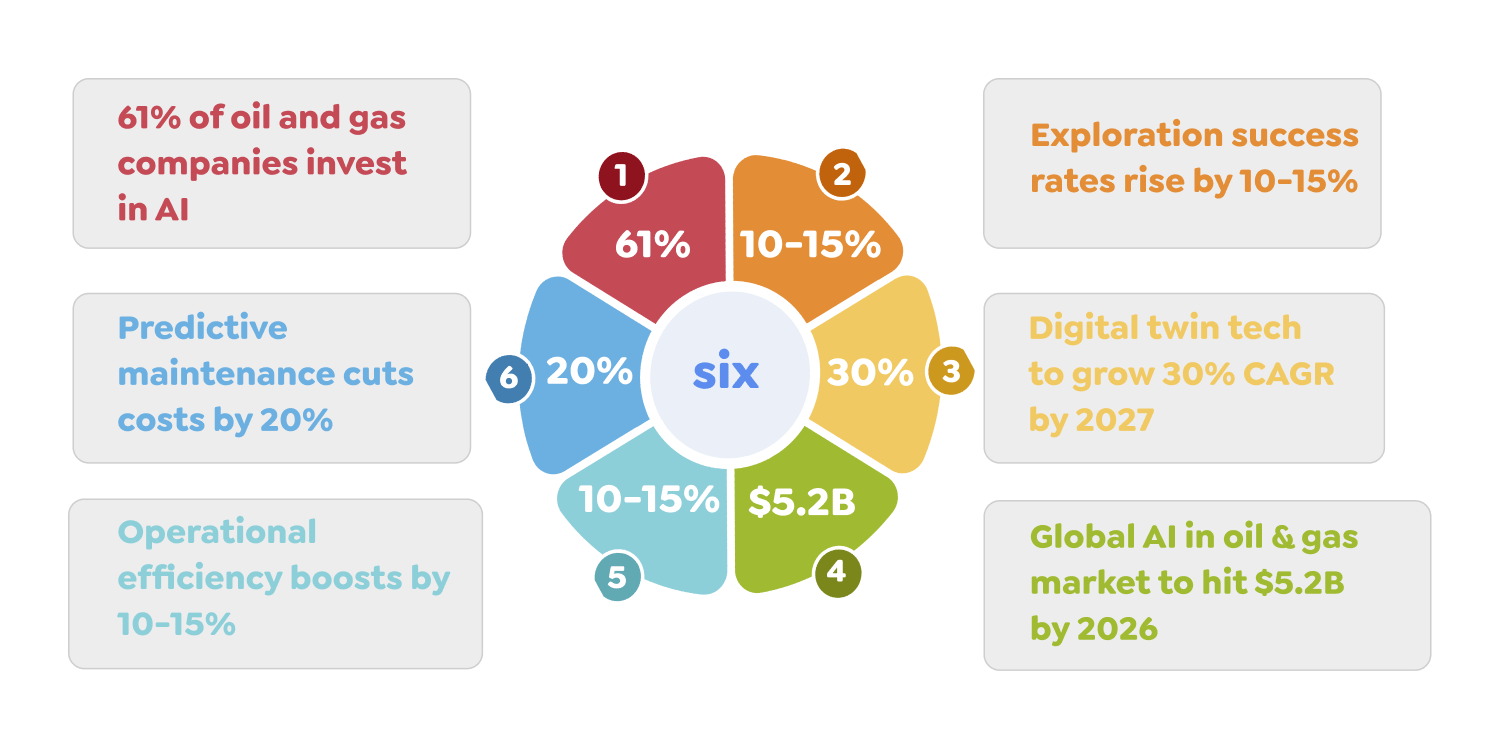
This blog will overview how artificial intelligence in oil and gas industry can transform the sector. Topics will include AI innovations that enhance efficiency and develop better safety measures while increasing sustainability. Some might also include AI-based software development and applications related to machine learning, creating innovation within the industry. It will discuss the importance of mobile app development in the oil and gas sector and recommend some significant companies.
Also Read : Fuelling Up Fintech with Blockchain Technology: A Comprehensive Overview
Oil and gas automating operations through AI streamlines operations by automating processes, predicting outcomes, and enhancing the basis for better decision-making. Predictive maintenance tools powered by AI could predict equipment failures through data from sensors even before they occur. Thus minimizing unplanned downtime and reducing maintenance costs by as much as 20%.
AI algorithms further optimize drilling operations by analyzing geological data, helping companies identify the most productive sites that require fewer resources. In addition, machine learning models can regulate the production parameters in real-time. This may improve operational efficiency by 10-15% and raise the maximum output without further investments.
Safety is a significant concern in the oil and gas industry. An equipment malfunction or explosion and leaks lead to huge fears for safety. The AI-based systems enhance safety by tracking equipment, pipelines, and all environmental conditions. For example, AI algorithms can detect anomalies in the equipment’s functioning, alerting through alarm signs before final failure. Computer vision technology allows it to watch the working behavior at distant locations and flag non-compliance with safety protocols while reducing human error. Automated systems determine the chances of accidents through past data, so companies can be proactive by taking precautionary measures to minimize risks.
Also Read : The Ultimate Guide to Energy Management Software Development: Mastering Energy Efficiency!
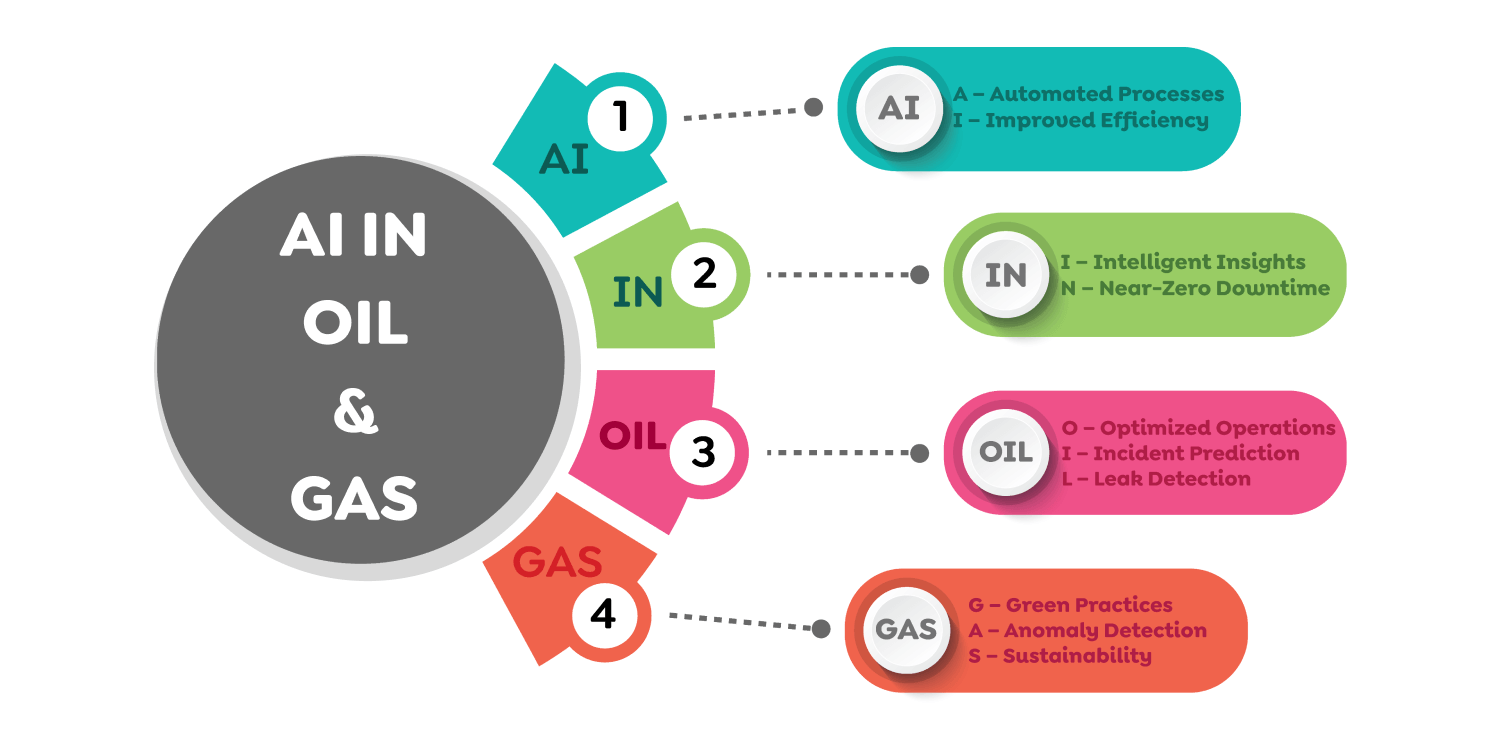
The oil and gas industry leaders are pressured to curtail emissions and adhere to rigorous environmental regulation requirements. Within that scenario, AI would be involved in sustainable practice, for instance, optimizing energy use coupled with a reduction in emissions through live tracking. AI may enable dynamic real-time production adjustment to minimize flaring such that less gas is wasted and emissions in terms of CO₂ are minimized. The AI tools also identify pipeline leaks to prevent unnoticed leakages from being compromised by the environment. In this way, AI helps bridging the gap between greener practices and technological efficiency. It enables firms to align themselves with environmental goals and shrink their carbon footprint by integrating renewable energy resources into their business activities.
Custom software development is essential to this industry, as they implement AI solutions according to specific operational requirements. Unlike off-the-shelf software, a customized application is developed to think through specific difficulties and requirements of oil and gas operations. Such customized personalized can allow companies to embed AI technologies into their processes while not altering their workflows, which augments analytics capabilities, predictive maintenance, and real-time monitoring. For example, custom software may use AI algorithms to analyze large volumes of geological and production data. This enables companies to make informed decisions that optimize exploration and production activities.
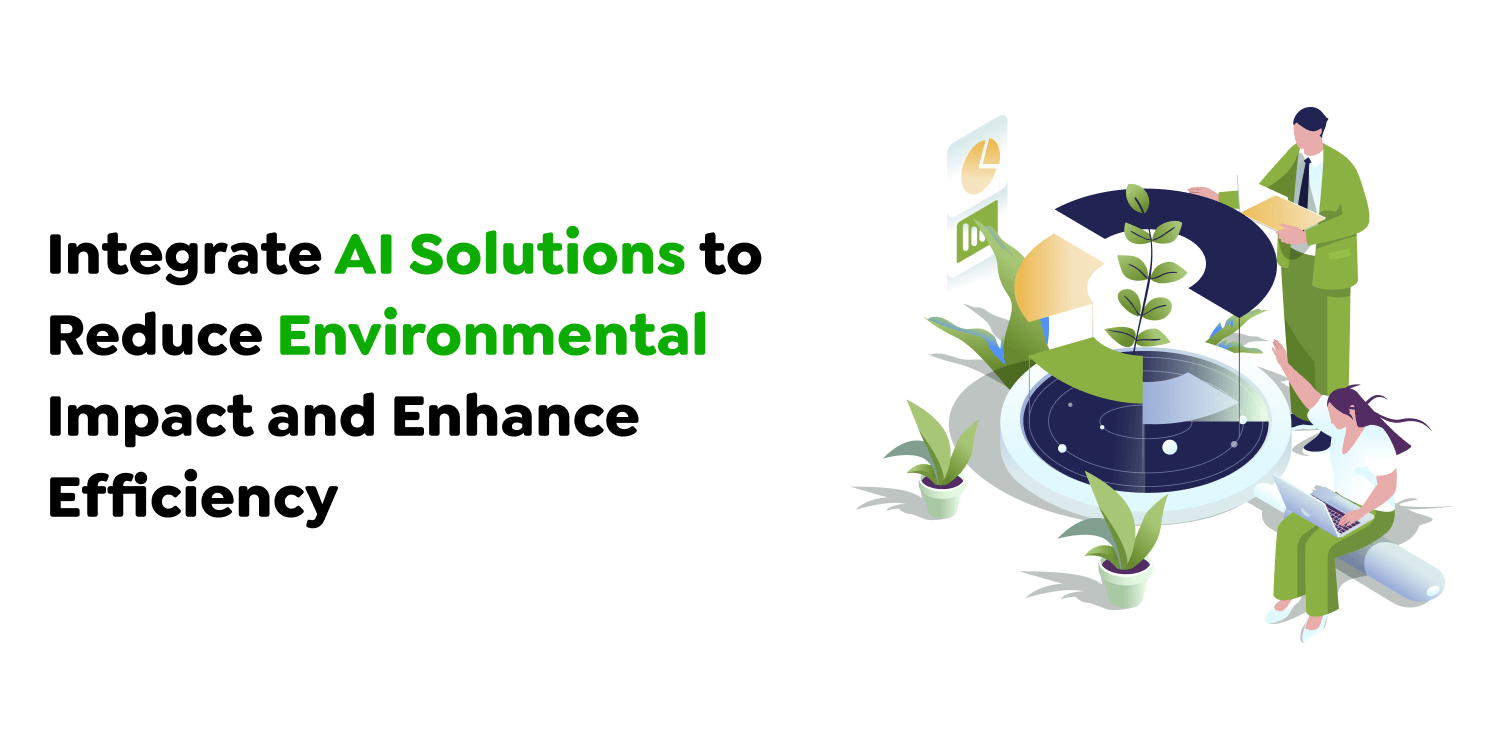
In addition, custom AI software fosters collaboration and effective communication between teams. It eliminates silos and allows valuable information to flow fluidly across the organization. Such integration fosters operational efficiency while allowing the company to rapidly adapt to changes in conditions, leading to improved financial performance.
The chance of any oil and gas project succeeding depends on the right AI app development company. According to experts, companies should seek partners with AI, machine learning, and data science expertise. Furthermore, the company must have a proven track record of producing successful projects in the oil and gas industry, showcasing its grasp of specific issues and requirements of the sector.
Key aspects to consider while selecting the best mobile app development company for you are:
An oil and gas software development company uses AI to optimize drilling operations with cost savings and higher success rates. Other companies used AI for predictive maintenance, preventing some failures and cutting downtime. Moreover, AI has been used to analyze seismic data more precisely to find oil and gas reservoirs.
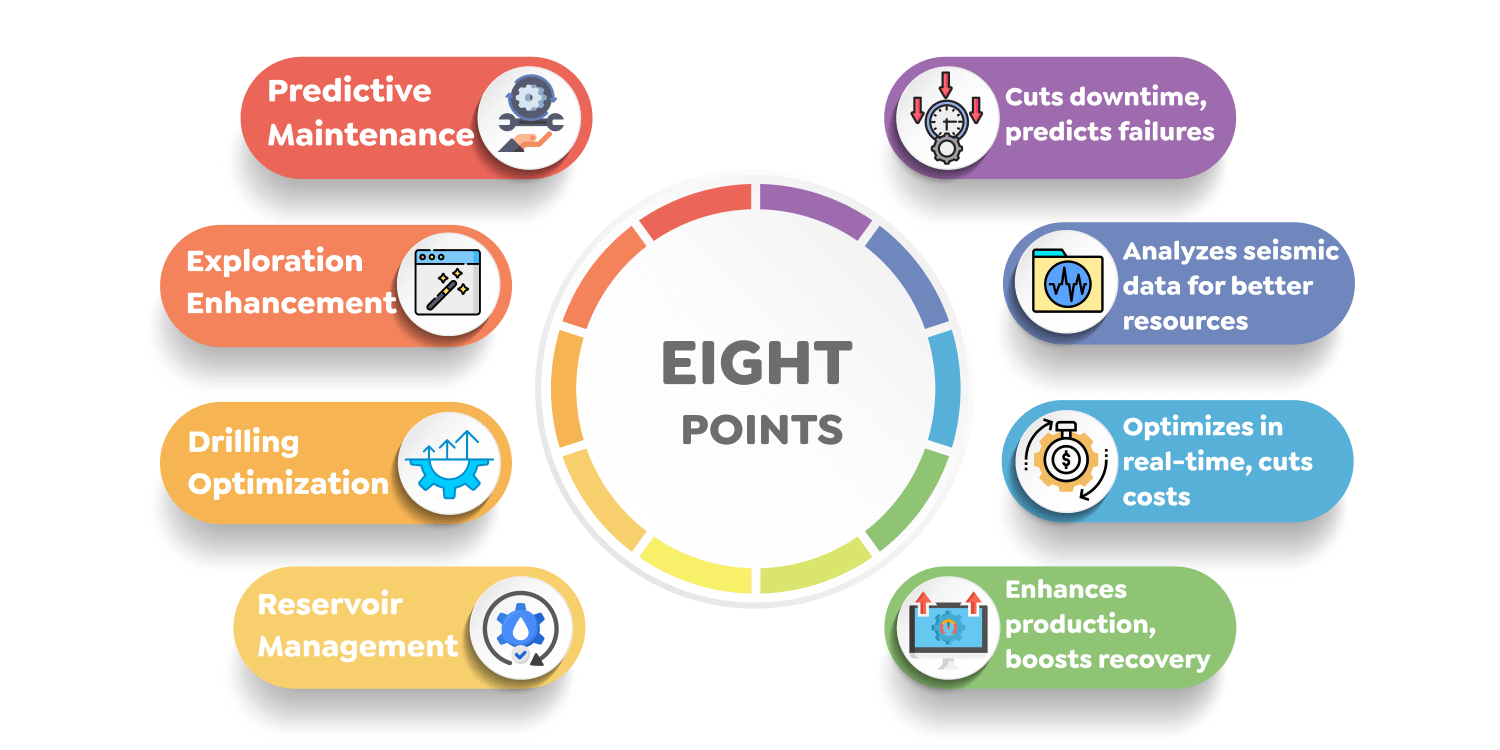
Several examples can demonstrate the potential transformation that custom AI software may bring to the specific needs of the oil and gas industry: efficient, safer, and sustainable:
BP has used AI-driven predictive maintenance systems with significant operational effectiveness. Since BP uses AI-driven predictive maintenance systems, it can accurately predict possible equipment failures through analysis of sensor data coming from various equipment of BP before they happen, thus reducing some downtime and cost on maintenance. This has increased BP’s efficiency and safety in its operations by a considerable percentage.
Shell has implemented AI technology by applying machine learning algorithms to analyze seismic activity data in its exploration processes. Such an application has enhanced resource identification accuracy, enabling Shell to make better decisions and increasing its odds of successful drilling.
TotalEnergies has implemented AI software to enhance drilling operations. The firm uses data analytics to adjust drilling parameters in real-time, reducing drilling time and costs and improving safety and environmental results.
Equinor developed AI for reservoir management, optimizing production strategies based on real-time data analysis. This technology, by efficiently providing, allows for an internally sustainable resource management model.
Also Read : DoorDash uses Machine Learning and Optimization Models To Enhance Customer Experience: Here’s How!
Machine learning (ML) is an area of artificial intelligence that involves the creation of algorithms that enable the machine to learn from data and make decisions or predictions, depending on it. Unlike regular programming, which gives step-by-step instructions, the more data it experiences, the better its performance. It is crucial to be able to learn from trends or patterns in data. Hence, it is essential for the oil and gas industry, which generates enormous amounts of data during exploration and production. Machine learning in oil and gas enables firms to analyze data and derive actionable insights.
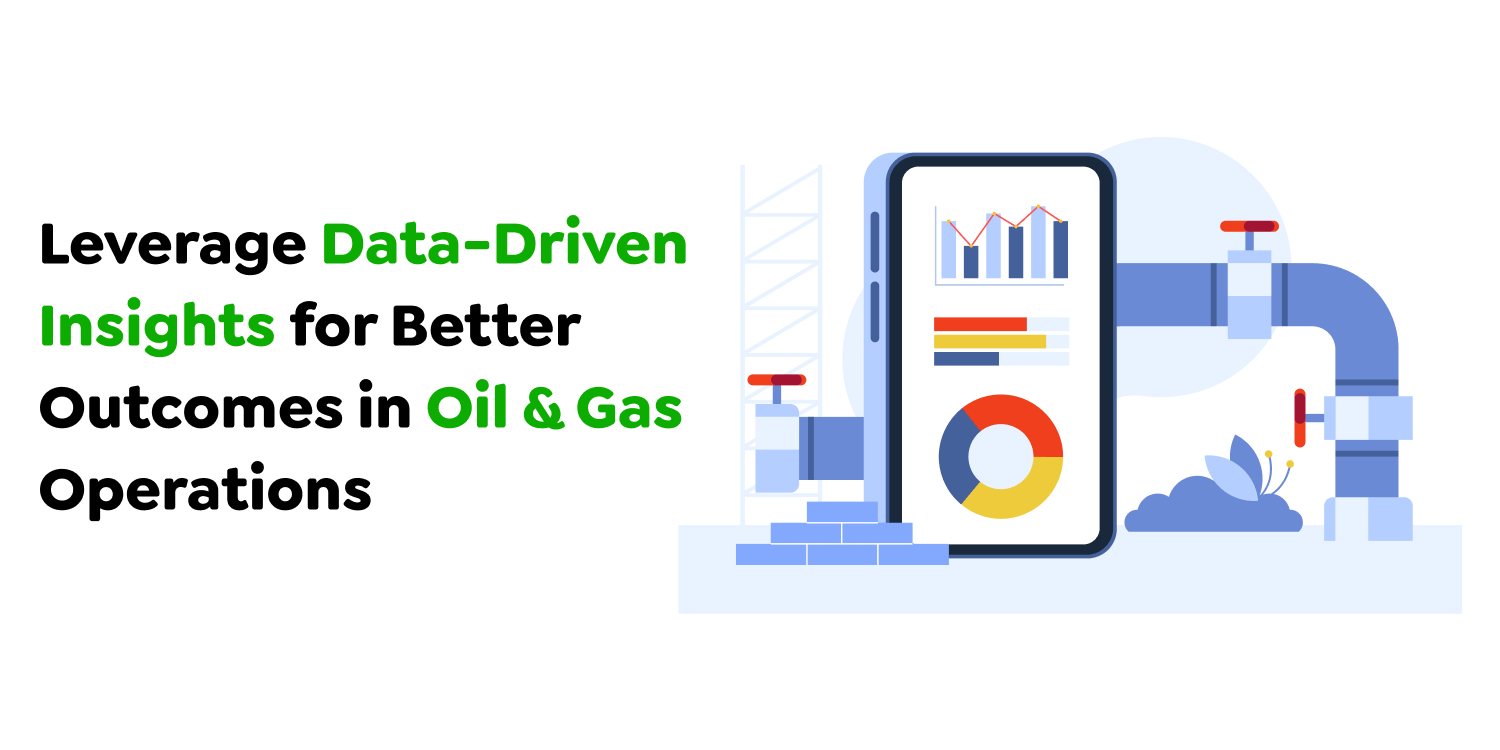
Also Read : Revolutionizing Tourism: The Impact of Artificial Intelligence App Development
In the oil and gas industry, machine learning can deliver diversified benefits, especially in data analysis and decision-making:
Today, mobile apps have become a staple within the oil and gas industry to streamline operations across various functions to promote efficiency, safety, and communication. Since field crews can work away from base locations, the mobile application provides access to and communication around real-time data for more informed decisions on the fly.
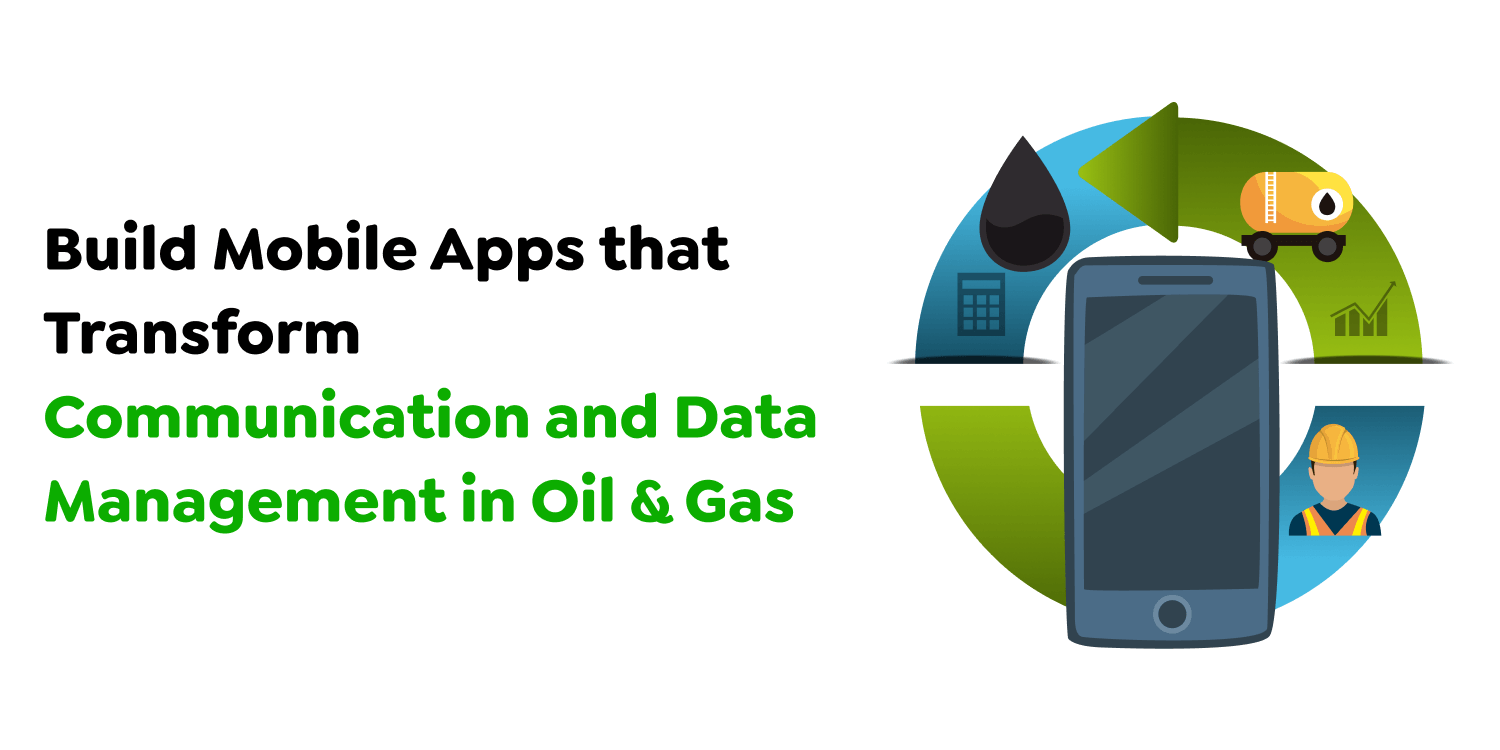
Wondering how to find your ideal development team to explore the possibilities of this industry? We’ve got you covered!
Techugo is a prominent software and mobile app development company. Their extensive experience with customized mobile applications will help understand the industry’s unique challenges and requirements. The capable teams of mobile app developers utilize advanced technology to provide innovative solutions enhancing operational efficiency and safety along with ensuring compliance.
Techugo’ portfolio, with its successful mobile app implementations for real-time communication, data analysis, and workflow optimization, they stand out in the world of apps. Their focus is on the application’s efficiency and effectiveness, with ongoing support and maintenance given to evolving industry landscapes.
Also Read : A Guide to Let You Build Your Advanced Mobile AI App

By partnering with Techugo for AI consulting, your organization will be empowered to leverage mobile technology for better efficiency and improved safety. Hence, delivering strategic outcomes via artificial intelligence in oil and gas industry.
The oil and gas industry is on the threshold of an epochal change; this time, driven primarily by technological inputs from AI and ML. Specifically, AI can serve better operations, enhance safety measures more, and make environmentally friendlier practices possible in the face of issues that companies must cope with regarding predictive maintenance, reservoir modeling, and, most crucially, exploration.
Mobile applications also play a crucial role in communication, data access in real time, and streamlining a mostly spatially dispersed industry’s work flows. It is thus important to identify and work with a reliable mobile app development company with a successful history and uses resources that can deliver this kind of support. We offer specialized mobile apps and AI solutions, aimed at specifically meeting the needs of the oil and gas sector. With such patentability of AI efficiency and possible cost reductions in the industry, it is advised that organizations tap into AI solutions.
Get in touch with us to access the benefits of artificial intelligence in oil and gas industry!
Write Us
sales@techugo.comOr fill this form